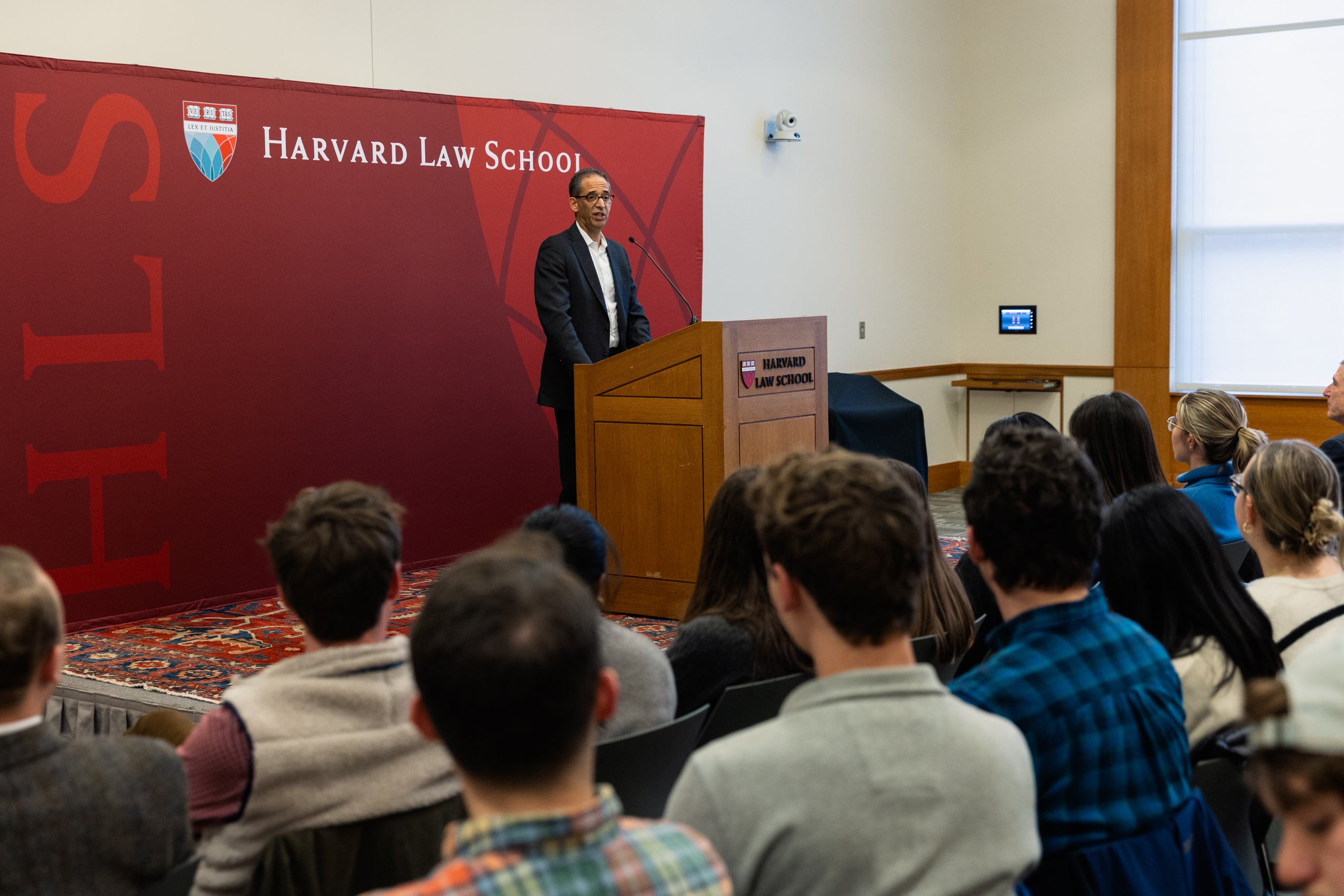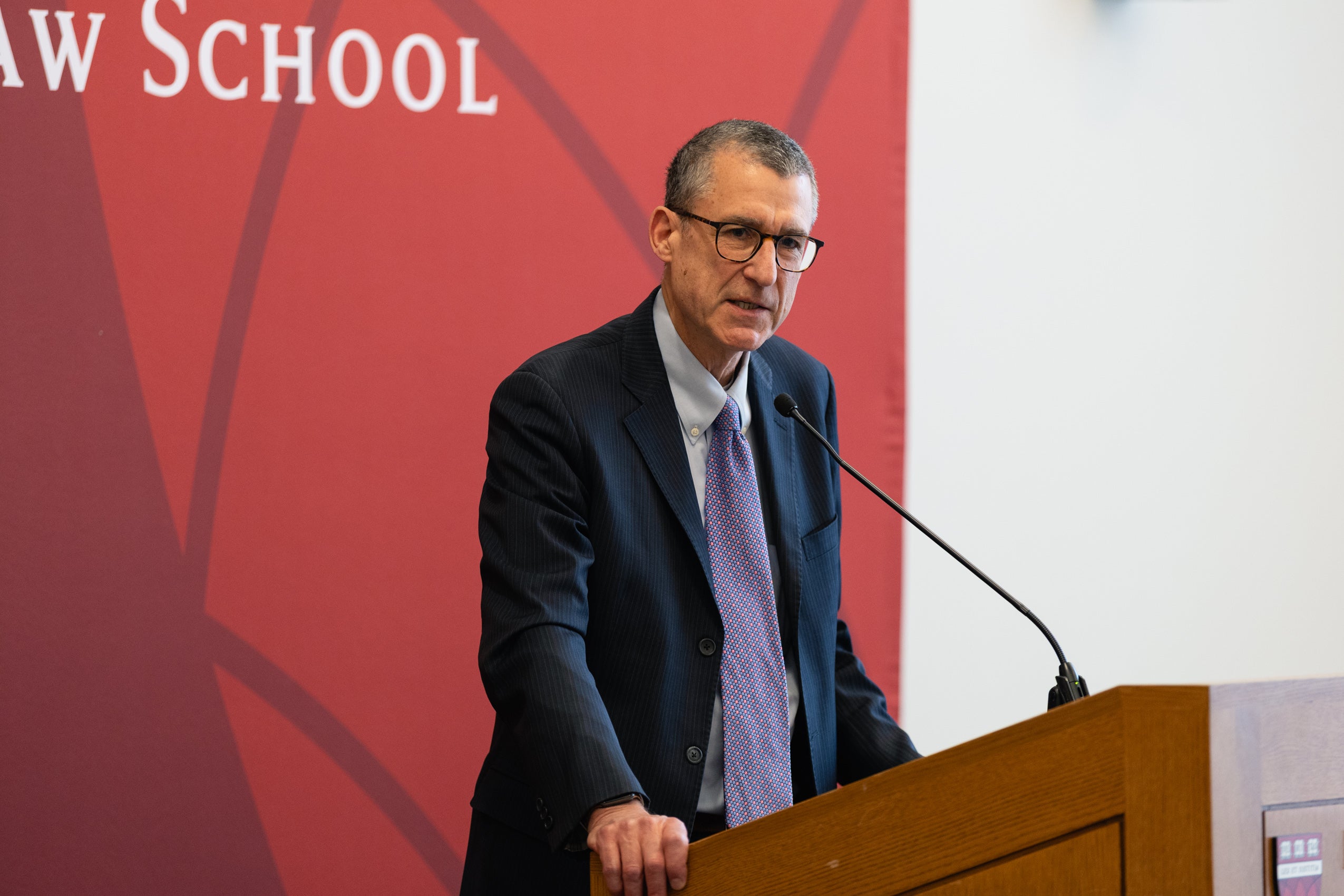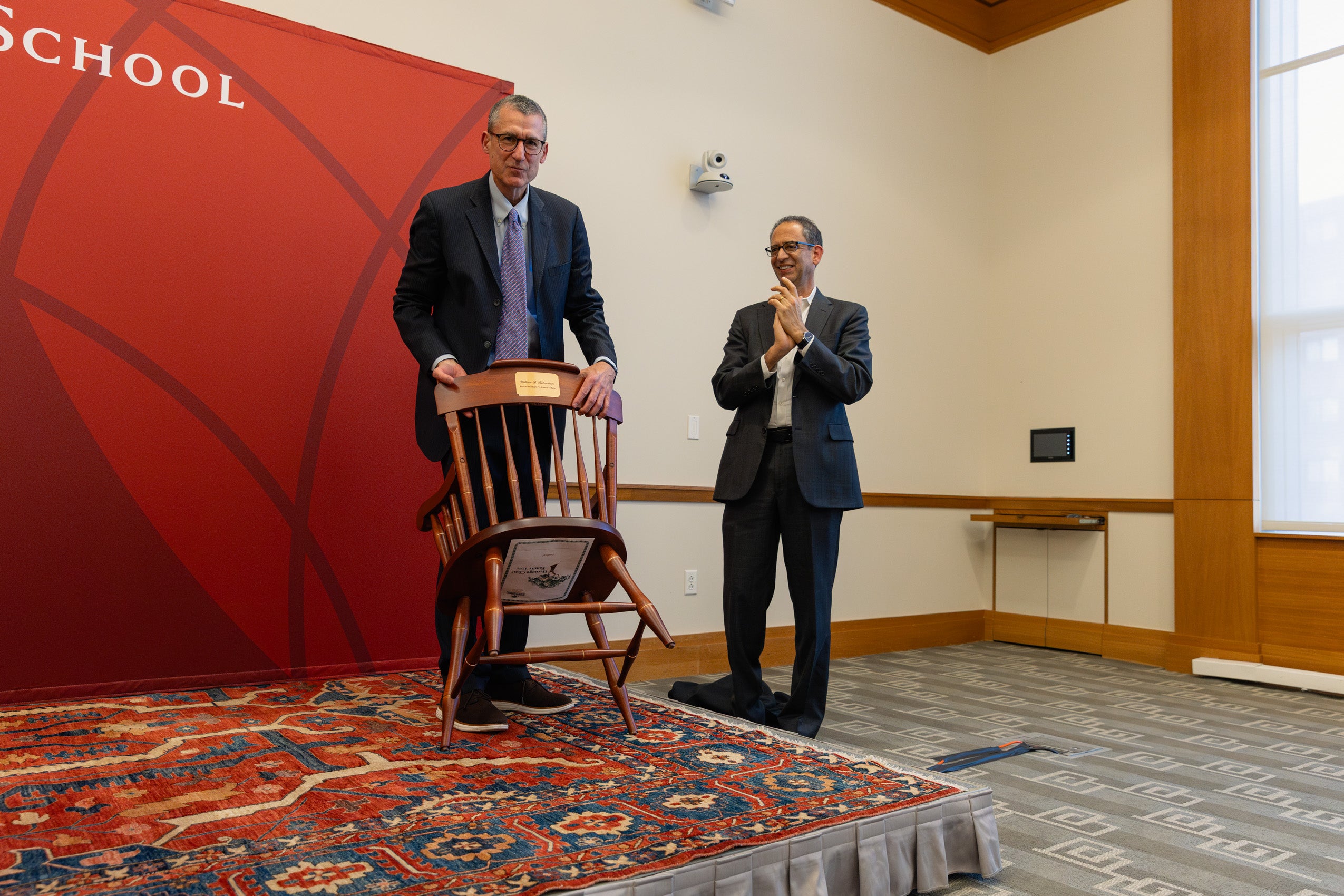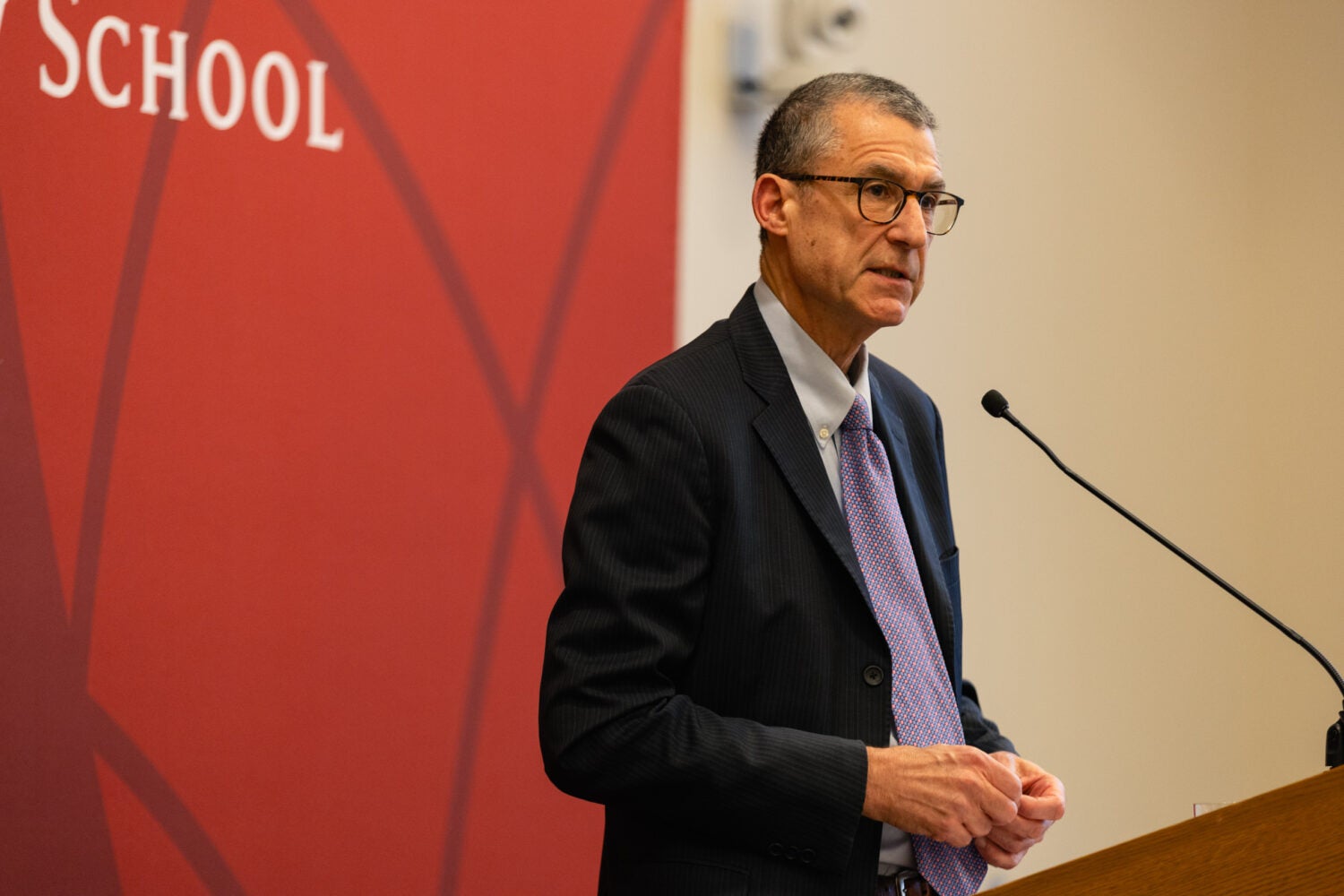When Professor William B. Rubenstein ’86 was studying for the bar exam and preparing for his first law job, a classmate issued a dire prophecy. Rubenstein’s chosen path, his peer said, was “career suicide.”
During an event at Harvard Law School last week, Rubenstein recalled how, just before graduation, he had accepted a fellowship working alongside the first attorney at the ACLU dedicated to gay and lesbian civil rights. There were just a few other lawyers doing such work in the entire United States at that time, aside from Rubenstein and his future colleague, and little focus on the area he had chosen: advocating on behalf of people with AIDS.
This was the mid-1980s, and attitudes toward LGBTQ issues — and HIV in particular — were often oppositional, and sometimes even hostile, Rubenstein recounted. So much so, he said, that when he told his fellow student what he planned to do, the classmate predicted it would end his career just as it was beginning.
But that prophecy, it turns out, could not have been more wrong. Last week, to mark the occasion of his 2018 appointment as Harvard Law’s Bruce Bromley Professor of Law, Rubenstein was honored for his more than three decades of practice, teaching, and scholarship about complex litigation, civil procedure, and sexual orientation and AIDS law.
As part of the event celebrating his new title — Rubenstein had previously been the Sidley Austin Professor of Law — Rubenstein presented a humorous and heartfelt lecture that tied together the diverse threads of his storied career, from his start as a practicing civil rights attorney to his current work as a leading authority on complex litigation, including class action lawsuits, on which he coauthored the seminal text now entitled, “Newberg and Rubenstein on Class Actions.”
In his introduction to the evening, Interim Dean John Goldberg praised Rubenstein’s ability to “straddle the boundary between the bar and the academy,” adding that he is an “extraordinarily gifted teacher” and practitioner who has “has earned the respect and trust of lawyers and judges around the world for his mastery of the tangled and ever shifting landscape of complex litigation.”
“Bill is a trusted advisor,” Goldberg added, “the sort of person to whom you go with a really hard problem, who listens as much as he counsels, and who invariably has real wisdom to offer. No wonder he is in so much demand.”

Rubenstein began his remarks by acknowledging a common opinion about his field. “Civil procedure is a punchline,” he said. And yet, he continued, “I’ve taught civil procedure 42 times in the last 30 years.”
“I’ve enabled generations of students to go home for Thanksgiving, preening among the yams and cranberries and pumpkin pie about their understanding of non-mutual offensive issue preclusion, even if, upon return in December, hm, not so much,” he joked.
Despite its unloved status, civil procedure is an inextricable and critical part of our legal system, and of the cases that matter most, Rubenstein suggested.
Rubenstein described his first time in court as a new lawyer with the ACLU. They had filed a lawsuit against Ronald Reagan, seeking to compel the president to appoint someone living with AIDS to the official commission on the disease, he said. After he stated, “’I’m here on behalf of people with AIDS,’” he recalled, the judge asked, “And what is it that they want, counselor?” Rubenstein reported, “I thought, ‘What do they want?,’ In my head, in my heart, I thought, ‘What they want is not to die.’ Out of my mouth came three other words: ‘temporary restraining order.’”
“With those words, I literally enacted the transformation from being a full human being to being a lawyer,” Rubenstein joked.
With that lawsuit, Rubenstein had hoped to compel the government to include representatives from the community that would be most directly impacted by the president’s commission. But the experience also raised questions about representation in Rubenstein’s own mind.
While there were an estimated 500,000 to a million people living with AIDS in the United States at the time, Rubenstein said, “the vast majority … had no idea they were members of the group.” And while Rule 23 of the Federal Rules of Civil Procedure allowed him to bring these individuals together as a group for purposes of a class action lawsuit, Rubenstein continued, “it would not be unfair to say that the group I purported to represent in court was, in many ways, a figment of my imagination.”
Given this legal fiction, Rubenstein wondered, how could he fully know what group members wanted? How could he best champion the interests of this amorphous class?
“I’ve now spent 40 years thinking, teaching, writing and lawyering about this single question: Who speaks for a group in court?”
‘Not a salad, but a main course’
To understand how this line of inquiry has shaped decades of his scholarship, Rubenstein outlined the three phases of a class action lawsuit and how each stage has a different answer to the seemingly simple question of who represents the plaintiff group members.
First, the lawsuit must be initiated by a typical member of the group seeking relief, Rubenstein said. A class action, he continued, is not a group getting together and going down to the courthouse to file a lawsuit. “A class action is the exact opposite. It’s a form of representative litigation. One member of the group goes down to the courthouse and litigates for the rest of the group.”
Then, when a class action approaches settlement, class counsel — the lawyers representing the group — should work with the class representative to do so, Rubenstein said. But where the class representative rejects a settlement that their lawyers think is satisfactory, class counsel can seek and win a court’s approval for the settlement over the representative’s wishes. “The law doesn’t allow class litigation to be initiated without a class representative, but the law doesn’t care very much what the class representative thinks about a proposed settlement.”
Finally, when the attorneys move to collect their fees, something peculiar happens, Rubenstein said. “At this point, class counsel is no longer the class’s champion, but its opponent,” he said, adding that every dollar for the lawyers is less money for the class itself. And because the class representative is considered too close to counsel to fully advocate for the larger group, the court itself acts as a fiduciary for the absent group members, Rubenstein said.


Given this multistage process, “We see that the very idea of who speaks for a group in court permits at least three different answers within the arc of a simple class action lawsuit,” he said. “What’s even more remarkable is that while each of the three positions seems defensible, in fact, [each of these ideas is] completely outrageous.”
Why? With respect to the class representative herself, she is “self-appointed,” Rubenstein said. “I’m not aware of any other form of representation where this approach is so wholeheartedly adopted.”
With respect to the second phase, where class counsel can obtain court approval for a settlement over the wishes of the class representative, there is an ethical problem, argued Rubenstein, because this is “the single area in which a lawyer does not speak for a client in defining the goals of the litigation.”
Moreover, because class counsel’s duty is to the larger class — not the class representative — there is an even larger issue, he said. “At its heart, class counsel’s relationship with the class representative is a purely parasitic relationship.”
Finally, the time to collect attorneys’ fees “might be the most bizarre deviation from norms of all,” Rubenstein argued. “The judge who is a fiduciary is also the same judge who adjudicates the contest between her own wards, the class, and the class’s lawyer.”
Rubenstein closed by recognizing that these issues raise few answers and yet more questions. But this is the nature of procedure, he argued.
“Procedure earns its status as a punchline when it’s understood as a dreaded book of settled rules, all adjacent to the main event,” he said. But procedure, he added, is “a set of standards … that are up for grabs, far from settled. And each one of them is fully outcome determinative, substantive. Not a salad, but a main course.”

These issues continue to be relevant, Rubenstein argued. He pointed as an example to the recent class action lawsuit filed in federal court to stop the deportation of Venezuelans who are alleged to be members of the Tren de Aragua gang. Because several of the class representatives say that they were wrongly rounded up because they are not gang members, the government argued that these individuals could not adequately represent the group.
But, Rubenstein said, “Against all odds … the nine justices, agreeing on very little, appeared all to support the proposition that each deportee was, in fact, entitled to the same thing: some kind of hearing, to due process.”
And that’s why all this matters, Rubenstein argued.
“The framers bequeathed to us a Constitution that guarantees, above all else, procedure,” he said. “Every generation gets the due process clause that it deserves, based on the issues of its day and the efforts of its citizens — especially its lawyers and its law students — in confronting those issues.”
Want to stay up to date with Harvard Law Today? Sign up for our weekly newsletter.
